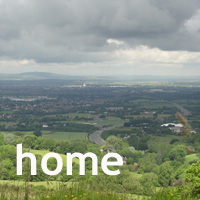The Plantations
 Saturday, June 18, 2016 at 2:27AM
Saturday, June 18, 2016 at 2:27AM We couldn’t spend time in Charleston without visiting at least one plantation so it was time to crank up the Chrysler and head on out of town.
It was another sizzler – warmer than yesterday in fact, and as we drove out on the highway it was already registering 88F. It was good to be leaving the built environment behind.
Half an hour later we were driving through swampy woodland, discussing the term “bayou” – was that a bayou we just passed, I asked? Who knows…we need to research! (Just did…the answer is yes, it probably was)
Our first destination was Magnolia Gardens, widely advertised as the best plantation gardens in the area and the oldest, by far, but more importantly, recommended to us as a “must see” by our friends Bill and Wendy.
Unfortunately, we’d missed the magnolias, the camellias and the azaleas but the hyacinths were looking great!
We got tickets for the house tour starting shortly, so made our way over there as instructed.
When we got there, we had a surprise. We’d been expecting a “Gone with the Wind” style mansion set in some kind of plantation though hadn’t thought much about it until now. But here was a rather simpler home and there was no plantation in sight – or at least, nothing we could recognise as such.
But before we gave it much further thought, our guide arrived and we learned more about what we were to see. There had been a grander “mansion” on the site – two previous incarnations, in fact. But both had burned down and when it came to rebuilding, the family chose to create a rather simpler affair, because it seems, they were hardly ever here. We learned that many years before it became commonplace to do such a thing, Magnolia Gardens were opened to the public and the owner, John Grimke Drayton actually made a reasonable living from the proceeds.
No photos were allowed throughout the house but believe me, it was no Calhoun Mansion inside but a simple home built and decorated in a modest style. What was really interesting though was not the house itself but the story of the Drayton family which can be read here too. Wandering through these rooms on a sticky hot Charleston day, it was easy to imagine why several family members didn’t like being here at all. The idea of the mosquitoes was bad enough but we learned too that the plumbing had been done in such a way that the phosphates in the ground leeched into the water, leading to kidney problems in those who lived here until the connection was made and the problem corrected.
More recently, the house had been used for entertaining and the guest list included people such as Eleanor Roosevelt, the Gershwin brothers and Orson Welles. Oh, and we learned about the plantation as well: this was an area where rice was grown until the Civil War, after which time a labour shortage led landowners to seek a different means of making a living. They’d discovered phosphates in the soil around here, which could be strip mined but in doing so, the land was ruined (poisoned) forever.
We were fascinated by all of this and delighted to find such a contrasting story to that at the Calhoun Mansion yesterday. There were links to the Charleston families we’d heard about yesterday too and we were able to piece some of the history together, making it all the more interesting.
As we left to explore the gardens, Mary asked about the “Grimke” name, for she’d recognised it from her knowledge of two sisters who feature strongly in the quest for equality and women’s suffrage. Sure enough, they were related to the family here, though their Southern upbringing motivated them to move north and devote their lives to working as abolitionists and political activists. Ed, our guide, told us of a recent novel based on their lives: The Invention of Wings , now on both our reading lists!
Wandering around the garden – well, not exactly wandering but actually, following the suggested route, we chatted about what we’d seen and learned. We’d really enjoyed the tour and the wild, uncomplicated garden was the perfect location to reflect on the story.
We’d learned that what we’d regarded as the front of the house hadn’t really been the front at all, since most people had arrived by boat from Charleston and would have approached the building from the side facing the river.
Before long, we too were standing by the river, imagining how it had been when this was the main route to and from the estate.
Actually, we didn’t have to imagine too much, for there was a reproduction of a photograph taken at the time, with a steamship offloading a party of people coming to visit the gardens just as we were doing.
The gardens were lovely, not in the conventional planting, but in the natural abundance and the seemingly untended and relaxed style. Clearly, much work is done here, for otherwise the garden would surely soon be overgrown and totally wild, but the gardeners are successful in knowing when to stop!
Oh, and the light and shade was magnificent. I have no idea what these flowers are but they were looking stunning in the sunshine, overhanging a deep, reflective pool.
Soon, we were back at the house and, of course, we exited through the gift shop!
I was interested to see cards inspired by the gates we admired yesterday in there
though my purchase was actually a pack of praline pecans, a local speciality we’d intended to try yesterday but missed out on.
(Thanks Bill and Wendy – your recommendation was spot on!)
After a spot of light refreshment we drove back through the swampy landscape, past a bayou or two (!) heading for the second plantation of the day: The Charleston Tea Plantation.
Whilst stopped at a junction, I had time to take a photograph and look more closely at the trunks of the palmetto trees here. Since we arrived, I’ve been intrigued by that regular interwoven pattern on every one. Isn’t nature wonderful?
The tea plantation is on an island and as we crossed the waterway, we spotted a bit of fun going on there.
This is a flat, open landscape with as much water as there is land. Interesting.
The tea plantation visit began and ended in the gift shop! A welcome sample of iced tea made a good start to the factory tour.
Not that there was a lot going on today. All was empty and silent so we simply followed the story as told in overhead video presentations. Ten minutes later, we stepped out to join the trolley tour of the plantation itself.
This was a long established tea plantation and it’s changed ownership a few times. Now, it’s operated by the Bigelow family and produces the only US grown tea.
We joined the trolley tour driven and guided by Beau, who spoke with an accent uncannily like Francis Underwood from House of Cards!
He drove us out into the original plantation, where there was a wide range of long-established tea bushes growing.
Here, comparisons could be made regarding which species grows well under these conditions and those species can be selected for propagation and replanting in greater numbers. Blends are then created to suit the tastes of the largely American customer base, most of whom drink tea iced.
The tea is harvested from the new shoots, dried, shredded and oxidised to create the end product.
Next stop was the propagation depot.
We saw where new bushes are grown from cuttings and how the whole process is managed using automatic climate control.
Not much was going on in the plantation either, but a little light maintenance was being done here.
A little more back breaking work was going on in the neighbouring area too and having seen what there was to see, Beau left us with a little South Carolina philosophy: start the day slowly and then taper off from there”. Quite honestly, in this heat, it’s hard to imagine being able to do much else – unless of course, you are a worker in a tea plantation and have work to do!
Returning to Charleston over the bridge again, we consulted the weather forecast. The temperature had crept up to the high 90s by now and the promise of thunderstorms seemed fairly reasonable. No sooner had we got in than the sky darkened, a breeze blew up out of nowhere and sure enough, a clap of thunder heralded a heavy rainstorm.
It didn’t stop us heading out for dinner and then on to our favourite Jeni’s ice cream afterwards though. After all, what are umbrellas for?
 USA in
USA in  friends,
friends,  fun,
fun,  road trip,
road trip,  travelling
travelling 








Reader Comments